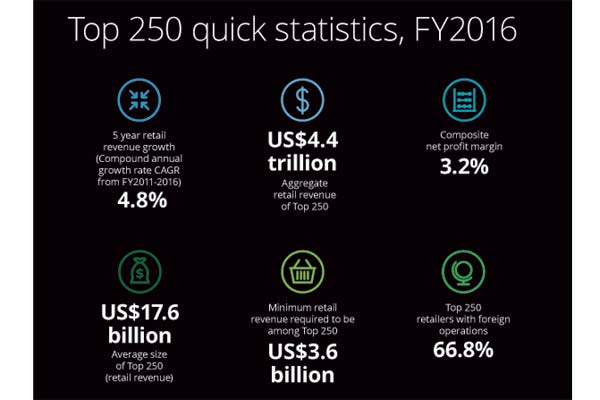
Lulu, Majid Al Futtaim, Savola among top 250 retailers
DUBAI, January 29, 2018
Three major retailers from the Middle East region - Emke Group/Lulu Group International, Majid Al Futtaim Holding and Savola Group – are on a new list of top 250 global retailers, launched by Deloitte Global.
Wal-Mart with a revenue of $485.873 billion in 2016 was on top of the list globally. The top 10 retailers also included: 2. Costco; 3. Kroger; 4. Schwarz Group; 5. Walgreens Boots Alliance; 6. Amazon; 7. Home Depot; 8. Aldi Group; 9. Carrefour; and 10. CVS Health.
Emke Group / Lulu Group International was ranked 141; Majid Al Futtaim Holding (151) and Savola was placed 244 on the list.
The Top 250 global retailers generated aggregated revenues of $4.4 trillion in fiscal year 2016, representing composite growth of 4.1 percent, according to the Global Powers of Retailing 2018: Transformative change, reinvigorated commerce report from Deloitte Touche Tohmatsu Limited (Deloitte Global).
“The global economy is currently in the midst of a period of relatively strong growth and benign circumstances. Growth has accelerated in Europe and Japan, stabilised in China and the US, and revived in many other emerging markets,” explained Dr Ira Kalish, Deloitte Global Chief Economist.
“For retailers, the stronger economic growth is most welcome. Yet they must also contend with the negative consequences of rising income inequality, protectionist actions, and the potential impact of monetary tightening.
“Emke Group/Lulu Group International, Majid Al Futtaim Holding and Savola Group appear on this year’s Top 250 retailers, a testament to the Middle East’s attractiveness for retailers. Together, the Africa/Middle East region’s 10.9 percent growth rate and 4.8 percent net profit margin composite in FY2016 were among the highest of the five geographic regions,” explains Herve Ballantyne, partner and consumer & industrial products industry leader, Deloitte, Middle East.
Global Powers of Retailing Top 250
The top five largest retailers maintained their positions on the leader board. A combination of organic growth, acquisitions, and exchange rate volatility shuffled the rest of the Top 10—which now accounts for 30.7 percent of the overall Top 250’s retail revenue (compared to 30.4 percent last year).
For the first time in four years, the apparel and accessories retailers were not the clear growth leaders, but they remained the most profitable sector.
Retailers of fast-moving consumer goods (FMCG) are by far, the largest companies (average retail revenue of nearly $21.7 billion) as well as the most numerous (135 retailers accounting for 54 percent of all Top 250 companies and two-thirds of Top 250 revenue).
Europe’s share of the Top 250 dropped again, with 82 retailers based in Europe (85 in FY2015, 93 in FY2014) and the gap widened versus North America. However, despite dropping share, European retailers remain the most globally active as they search for growth outside their mature home markets. Nearly 41 percent of their combined revenue was generated from foreign operations—almost twice as much as the Top 250 group as a whole.
Transformative change
Global Powers of Retailing 2018 also discusses how the rules of retailing are being rewritten in this time of transformative change. Innovation, collaboration, consolidation, integration, and automation will likely be required to reinvigorate commerce, profoundly impacting the way retailers do business now, and in the future.
The four trends identified in the report are:
• Building top-notch digital capabilities. Retailers across the globe are rapidly adapting to the fact that, from the consumer perspective, shopping is not about bricks versus clicks or one channel versus another. Instead, consumers are channel-agnostic.
• Combining bricks and clicks makes up for lost time. Many players that may have initially been on the sidelines, failing to keep up with digital trends, are now making up for lost time in a big way.
• Creating unique and compelling in-store experiences. Physical retail stores are not going away; 90 per cent of worldwide retail sales are still done in physical stores. But to compete with the convenience and endless aisle assortment offered online, meaningful customer experiences and brand engagement is crucial.
• Reinventing retail with the latest technologies. The Internet of Things, artificial intelligence, augmented and virtual reality, and robots should be on every retailer’s radar.
“It is a transformative time in retail. The shopper is clearly in the driver’s seat, enabled by technology to remain constantly connected and more empowered than ever before to drive changes in shopping behaviour,” said Ballantyne. “Across the retail industry, disruption of traditional business models has given way to unprecedented and transformative change—change required online and offline to better serve more demanding shoppers and redefining customer experience.” - TradeArabia News Service







